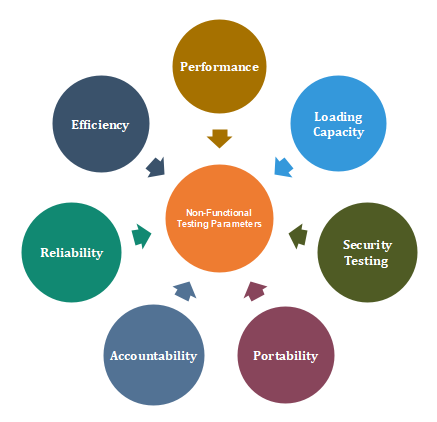Non-Functional TestingNon-functional testing is a type of software testing to test non-functional parameters such as reliability, load test, performance and accountability of the software. The primary purpose of non-functional testing is to test the reading speed of the software system as per non-functional parameters. The parameters of non-functional testing are never tested before the functional testing. Non-functional testing is also very important as functional testing because it plays a crucial role in customer satisfaction. For example, non-functional testing would be to test how many people can work simultaneously on any software. Why Non-Functional TestingFunctional and Non-functional testing both are mandatory for newly developed software. Functional testing checks the correctness of internal functions while Non-Functional testing checks the ability to work in an external environment. It sets the way for software installation, setup, and execution. The measurement and metrics used for internal research and development are collected and produced under non-functional testing. Non-functional testing gives detailed knowledge of product behavior and used technologies. It helps in reducing the risk of production and associated costs of the software. Parameters to be tested under Non-Functional Testing
Performance TestingPerformance Testing eliminates the reason behind the slow and limited performance of the software. Reading speed of the software should be as fast as possible. For Performance Testing, a well-structured and clear specification about expected speed must be defined. Otherwise, the outcome of the test (Success or Failure) will not be obvious. Load TestingLoad testing involves testing the system's loading capacity. Loading capacity means more and more people can work on the system simultaneously. Security TestingSecurity testing is used to detect the security flaws of the software application. The testing is done via investigating system architecture and the mindset of an attacker. Test cases are conducted by finding areas of code where an attack is most likely to happen. Portability TestingThe portability testing of the software is used to verify whether the system can run on different operating systems without occurring any bug. This test also tests the working of software when there is a same operating system but different hardware. Accountability TestingAccountability test is done to check whether the system is operating correctly or not. A function should give the same result for which it has been created. If the system gives expected output, it gets passed in the test otherwise failed. Reliability TestingReliability test assumes that whether the software system is running without fail under specified conditions or not. The system must be run for a specific time and number of processes. If the system is failed under these specified conditions, reliability test will be failed. Efficiency TestingEfficiency test examines the number of resources needed to develop a software system, and how many of these were used. It also includes the test of these three points.
Advantages of Non-functional testing
Disadvantages of Non-Functional Testing
Next TopicUnit Testing
|
 For Videos Join Our Youtube Channel: Join Now
For Videos Join Our Youtube Channel: Join Now
Feedback
- Send your Feedback to [email protected]
Help Others, Please Share










